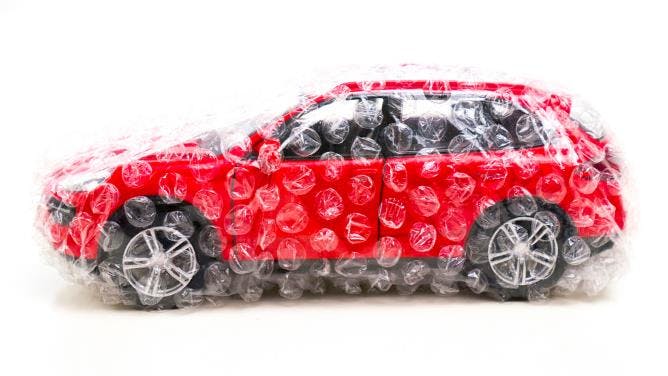Why Do Young Drivers Pay Higher Insurance Premiums?
February 2, 2024
•11 min read

Sam Plant
Content Writer

Once you’ve passed your driving test, you’ll finally be able to take to the roads unsupervised and let the wind blow through your hair. Well, that’s as long as you’ve sorted out your car insurance. Whether you’re hoping to get insured for your parent’s car or you’ve got your hands on your own vehicle, it might be more difficult than you thought. Unfortunately, young drivers pay higher insurance premiums than any other age group.
In this guide, we’re going to look at exactly why young drivers pay higher insurance premiums and how you might go about driving this cost down.
The cost of car insurance
If you thought the cost of learning to drive was steep, you might find yourself weeping at the cost of car insurance. According to Compare the Market’s Premium Drivers Report (as of April 2019), the current average insurance premium stands at £736. Believe it or not, this figure is marginally lower than premiums have been in recent years. That being said, it’s still a hefty sum to have to fork out for. There are plenty of factors that contribute towards this, as noted by Compare the Market…
- Insurance Premium Tax (IPT): an increase to 12% in 2017 has seen drivers forking out even more for their insurance.
- Higher cost of claims: with an increase in car crime and pricey repair bills in recent years, the ABI estimates that over £23 million in claims is paid out every day.
- Insurance fraud: a drastic increase in insurance fraud is costing the insurance industry £1.3 billion.
- Uninsured drivers: an estimated 1 million drivers on UK roads are uninsured. Unfortunately, insured drivers quite literally pay the price—an estimated £30 more for annual policies.
If you thought £736 was expensive, you might want to take a quick breather—because that’s nothing compared to what young drivers have to fork out for their insurance premiums! If you weren’t already aware, average premiums can vary wildly depending on the age group you fall into.
Super Save up to £319.82* on your car insurance with MoneySuperMarket* *51% of consumers could save up to £319.82 on their annual car insurance premiums. Consumer Intelligence, May 2022, UK only.
Insurance premiums by age
| Age Group | Average Insurance Premium |
|---|---|
17-20 | £1,248 |
21-24 | £1,141 |
25-29 | £767 |
30-39 | £564 |
40-49 | £396 |
50-64 | £286 |
65+ | £264 |
Source: MoneySuperMarket (data from January - July 2018)
Well, it certainly doesn’t look good for young drivers! While insurers work out their premiums in different ways, meaning that figures fluctuate depending on the insurance company, the gulf between age groups remains the same. No matter where you look, young drivers (those under the age of 25) will have to pay more for their insurance than any other age group.
Recent figures from Compare the Market brings the average premium cost for young driversat £1,281! As you can imagine, not all drivers in this age group can actually afford to buy a car, maintain it and insure it. That’s why many young drivers look to their parents to help shoulder the weight—with parents paying an average of £288 each year.
Ingenie's learner insurance is a flexible learner policy that allows learners to practise in someone else’s car for 1-6 months, with the option to top up if they need more time, while protecting the car owner’s No Claims Discount.
So, why exactly are premiums so steep for young drivers? Let's take a look below…
Why do young drivers pay higher insurance premiums?
No matter where you look, insurance premiums are always higher for young drivers. But why exactly is this the case? When it comes to insurance—whether it’s for vehicles, homes or people—it’s all about risk. If an insurer deems you a risk to insure, they’ll consequently charge you more for premiums. By doing so, they can essentially make up the cost for when you end up making a large claim. Unfortunately for young drivers, insurers label them a high risk to insure.
Wondering why? Well, it all boils down to a few key factors…
Age
If you’re under 25 years old, you’re automatically labelled a high risk to insure. Before you start accusing insurance companies of being ageist, they do have facts and figures on their side. Statistically speaking, younger drivers are more likely to be involved in an accident than any other age group. Let’s take a look at some key stats…
- Young drivers under 25 have a claim rate that’s 27% higher than drivers over 25 (Admiral).
- 1 in 5 accidents involving young drivers has an injury claim and 30% of all claims are for drivers under 25 (Admiral).
- 1 in 5 young drivers will have an accident within 6 months of passing their test (RAC).
- Whilst young drivers make up only 7% of licence holders, they represent over 20% of those killed or seriously injured in car crashes (Brake).
And that’s just the tip of the iceberg! Insurers will have reams of additional stats at their disposal. The point, however, is that the numbers just clearly aren’t in favour of young drivers. (We can already hear your disgruntled grumbling!). Unfortunately, there’s nothing you can do to get around these stats. Insurers can’t very well take a leap of faith when you tell them you’re a great driver—they have to take a look at the cold hard facts and create a general premium for all young drivers.
Inexperience
Regardless of how many driving lessons you’ve taken, young drivers don’t have as much experience on the roads as other age groups (not counting older learner drivers, of course). If you’ve just passed your driving test, you’re only just getting used to driving around unsupervised—meaning you’re likely to slip up without your ADI. RAC notes that young drivers “are at particular risk because of both their lack of experience and the biological and behavioural characteristics of youth”. Brake cites the following reasons for why young drivers are more at risk on the roads:
- Overconfidence
- Poor assessment of hazards
- Prevalent risk taking
The charity group also reveals that “research has shown young drivers show poorer attention, visual awareness, hazard recognition and avoidance, and are less able to judge appropriate speed for circumstances”. With time and experience on the roads, however, young drivers are far less likely to indulge in this type of risky behaviour and will have sharpened their multitasking and hazard perception skills.
There are, of course, exceptions to every rule. We know very well that this isn’t the case for every young driver out there. Unfortunately, even if you consider yourself to be the epitome of the perfect driver—with superb reflexes and pro defensive driving skills—you’re still seen as an inexperienced driver. As such, you’ll be lumped with the same insurance premiums as other drivers your age.
No Claims Bonus
One of the ways in which insurers are able to calculate how safe a driver is, is by looking at their No Claims Bonus (NCB). Not sure what this is? It’s pretty simple—the clue is in the name! For every year a driver is able to go without making a claim, the insurance company will increase a discount percentage. The exact percentage will differ depending on the insurer, but here’s an example scale to give you a rough idea:
- 30% for 1 year
- 40% for 2 years
- 50% for 3 years
- 60% for 4 years
- 65%+ for 5+ years
Obviously, if a driver has a good NCB, they're far less of a risk to insure. As a result, insurance companies are far more likely to reward them with lower insurance premiums. Unfortunately, most young drivers won’t have had the chance to build up a No Claims Bonus—and with this age group being the one most likely to make a claim, insurers won’t just take your word that you won’t need to make a claim. Of course, if this isn’t the first time you’ve had to sort out your insurance, you might already have a No Claims Bonus. Some learner driver insurance packages enable you to build an NCB, so it’s worth checking.
Insurance Premium Tax
If you’re not entirely sure what Insurance Premium Tax (IPT) is, fortunately, it’s relatively simple. It’s a percentage that is added to the total cost of your insurance premium—working in the same kind of way as VAT. Compare the Market have used the following example to make it clearer: “A car insurance premium of £500 will be £560 including the standard rate of 12%.”
Unfortunately, we’ve seen a drastic rise in IPT in recent years to a staggering 12%. In fact, drivers are now paying an average of £56 more for IPT than they did back in 2015. With young drivers paying the highest insurance premiums out there, they’re the ones paying the price for the rise in IPT—something that, unfortunately, can’t be avoided.
Why do insurers charge such high premiums?

Even though figures from Consumer Intelligence show a small drop in average insurance bills—an 8.5% decrease in the last 12 months—young drivers still have to pay an average of £1,635, compared to £412 for those over 50 and £629 for motorists aged 25-49. Just by looking at these figures, it’s easy to rile yourself up and assume that all insurance companies are out to bleed you dry. Whilst it is unfair that the statistics allow insurers to charge young drivers more, even if you’re one of the best drivers on the road, it does make sense.
With young drivers being the age group most likely to end up in an accident, insurers often end up having to pay out bigger claims for them. As a result, it’s only natural—and business-savvy—to charge higher premiums in order to make up the cost. Essentially, it’s not personal with insurance.
Of course, it’s not just age and experience that gets factored into insurance premiums. As we’ll explain in the next section, insurers take a lot into consideration when calculating premiums. Fortunately, there are ways you can save money.
What else affects the cost of insurance premiums?
Age isn’t the only factor that insurance companies look at when calculating insurance premiums. In order to set the right price, insurers will ask you to provide a lot of personal information—painting the full picture of what kind of driver you are and what they’re getting into if they decide to insure you on the roads.
Let’s take a look at what else goes into calculating insurance premiums…
Policy type
Your chosen policy type will impact your premiums. Before you opt for the bare minimum cover level, you should know that basic third party cover will cost more than a fully comprehensive policy.
Excess amount
If you opt for a higher excess—the amount of money you’ll pay in the event of a claim— you’ll get a lower premium.
Monthly or annual
Though it’s easier to pay for insurance on a monthly basis, it often works out cheaper to pay on an annual basis.
Occupation
If you have a job that requires you to be on the road more, you’re more likely to be in an accident than someone who works from home—meaning higher premiums.
Vehicle type
Cars that are high in value and have been modified will cost you far more to insure.
Location
As you’d imagine, drivers living in busy city centres will have to fork out more—with a higher risk of accidents.
Driving history
Those who have driving offences on their record, or have claims, will see a hike in insurance premiums.
Wondering if gender is factored into your insurance premiums? Check out: is there a gender gap in car insurance?
How can young drivers get cheaper premiums?
Whilst there’s absolutely nothing you can do about your age or inexperience, it doesn’t mean you’re entirely stuck with extortionate insurance premiums. If you’re savvy enough, you can save hundreds of pounds—all it takes is a bit of light reading!
For starters, you’ll want to check out our guide that takes you through the intricacies of young driver insurance. With it, you can use our top 10 tips for saving money on your young driver insurance and enjoy reduced premiums as a result. You’ll also find it worthwhile reading up on what to check for when buying car insurance—ensuring you won't get caught out by any fine print or legal jargon! You might even consider buying a dash cam—in the event of an accident, your footage could prove it wasn't your fault. Plus, some insurers offer discounts with the right dash cam.
MoneySuperMarket is a 100% independent car insurance comparison site, and they are on your side; that is why they use their own money to provide cheaper prices on a range of even policies, so you can save even more.
And that’s not all! According to Compare the Market, shopping around for insurance could save young drivers up to £263! As such, it’s well worth your time to look at comparison sites to see which insurance policies are most suitable—and cost-effective—for you. Another great option for young drivers looking to save money is a black box or telematics insurance policy. With it, you can get rewarded for safe driving with cheaper premiums!
FAQs
1. Do I have to be insured to drive?
Yes—we cannot stress this enough! It is illegal to drive on the UK roads without insurance and if you’re caught, you could get a fixed penalty of £300 and 6 points on your licence. If it goes to court, you could be disqualified from driving!
2. Will my premiums go down once I’m over 25?
It is possible that you might see a reduction in your insurance premiums once you’re no longer classed as a young driver. Remember, though, that insurance companies look at a variety of factors in order to calculate your premiums. If you want to reduce your premiums, it’s not enough to simply wait for your next birthday! Check out our tips and you could save plenty!
3. How will a black box policy affect my premiums?
It all depends on your driving performance. If you’re sticking to speed limits, braking carefully and fit the insurer’s specifications, you’ll see a reduction in your insurance premiums. On the other hand, if you partake in risk behaviour at times, you’ll see a steep hike in your premiums. It’s worth thinking about what kind of driver you are before forking out for a black box—it could cost you more if you’re not careful.
4. What types of insurance policies are on offer?
There are three main types of insurance policies on offer:
- Third party: the most basic type available, covering repairs/injuries for third parties affected by an accident caused by you
- Third party, fire and theft: the above, plus cover for theft/vandalism to your own vehicle.
- Comprehensive: covers the above, as well as paying for any damages to your own car in an accident.
In most cases, a comprehensive cover will be your cheapest option.
5. What details will I have to disclose for quotes?
You’ll have to fill in a few forms in order to get insurance quotes catered to you. Typically, you’ll need to provide personal information, such as your age, occupation, location and vehicle type. Insurers will also ask about your driving history, No Claims Bonus and preferred policy type. Make sure the information you provide is correct, otherwise the premium calculated won’t be right.
6. How will my premiums be affected if I make a claim?
Unfortunately, if you end up making a claim, you’ll typically see a hike in your insurance premiums when it’s time to renew your policy. If you opted for a protected No Claims Bonus, however, you’ll be able to make a certain number of claims and still retain your No Claims Bonus—this will cost you more, however.
7. Can learner drivers buy insurance?
Yep! Whether you’re looking to drive around in your parent’s car or you have your own, you can definitely buy insurance. Simply take a look at our guide to how to get a good insurance deal as a learner driver!
8. Should I stick with the same insurer?
If you want to avoid having to pay high insurance premiums again, you’ll want to avoid sticking with the same insurer. As we’ve said before in our insurance guides, you don’t get rewarded for your loyalty with insurance. Typically, you’ll get a cheaper deal if you switch insurers when your time is up.
With AXA you’ll get car insurance you can count on - they paid out on 99.7% of claims in 2018 – 2019. As well as being ready to help in an emergency 24 hours a day, every day, you can rely on car insurance awarded Defaqto’s 5 Star Rating – the highest standard
Subscribe for driving advice, offers & more
We'd love to let you know about our courses, news and offers via email. You may unsubscribe at any time.
Star Genie Limited trading as PassMeFast. Company number 10093359
Copyright © 2024 owned by Star Genie Limited
PassMeFast, Blue Tower, MediaCityUK, Salford, M50 2ST
